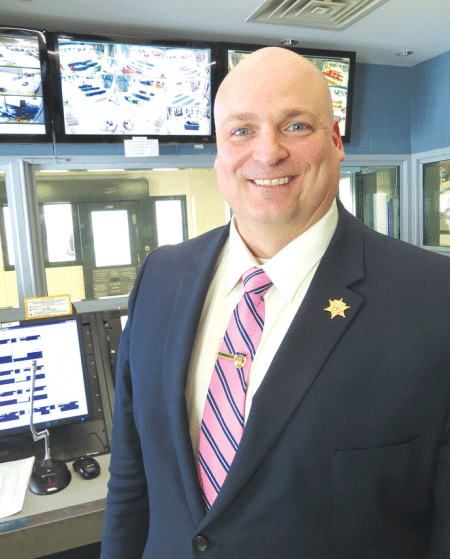
Nick Cocchi Inspired, Not Intimidated by His Predecessor
New Sheriff in Town

Nick Cocchi
Nick Cocchi called him the “Babe Ruth of corrections.” That’s one of the many ways the current sheriff of Hampden County paid respect to the former sheriff, Michael Ashe. Following the Babe Ruth of anything is an extremely daunting task, but Cocchi says he has the experience, the confidence, and, perhaps most importantly, the blueprint Ashe left him to succeed in that assignment.
Nick Cocchi says he can easily understand why someone would be intimidated by the prospect of succeeding Michael Ashe as sheriff of Hampden County.
After all, Ashe held that post for more than four decades, becoming a regional institution in the process. He won accolades on the local, regional, and national levels — including BusinessWest’s Difference Maker award in 2016 — and received phone calls and letters from correctional leaders across the country and around the world seeking to tap into his vast reservoir of knowledge and experience.
Meanwhile, his annual fund-raiser, known colloquially as the ‘clambake,’ drew a veritable who’s who of local and state elected officials — as well as those hoping to join those ranks. The coveted prize at those gatherings was getting one’s picture with the sheriff in the paper the next day.
Yes, Ashe’s tenure represents the quintessential hard (maybe impossible) act to follow.
And yet, Cocchi was more than enthusiastic about the prospect of being the individual to script the next one. In fact, he told BusinessWest during a very candid interview, he was far more intimidated by the possibility of losing the sheriff’s race — and therefore likely losing his job with the department — than he was by the prospect of being the next individual to wear the badge.
“For all the reasons most people wouldn’t want to follow him, I do,” he explained. “I’ve had the pleasure of working with him for 23 years; this is the Babe Ruth of corrections, and I’ve watched his policies, I watched how he carried himself, I saw how he did things. The former sheriff was all about giving people second chances and opportunities; he spent the taxpayers’ money wisely and appropriately, and he gave people the right tools to go back to our communities. I’ve learned from him.”

Nick Cocchi says his department’s goal is to give inmates at the county’s jails (the men’s facility in Ludlow is seen here) the tools they need to contribute to society.
Overall, there are many reasons why the new sheriff isn’t fazed by following such a giant in this profession. For starters, Cocchi, who started working for Ashe when he was a student at Western New England College and never left his employ, is certainly not lacking for confidence. Nor does he want for experience in virtually every aspect of corrections, as the résumé we’ll review shortly will make clear. And, perhaps most importantly, he’s also firm in his belief that he’s had more than a little to do with those aforementioned phone calls, letters, and awards.
“I’m excited about the prospect of following the sheriff because I’m prepared to do it,” said Cocchi, who credited Ashe with creating what would have to be called a blueprint for other correctional leaders, including himself, to follow. “When you look at the work the sheriff has done, we’re not a good facility, we’re one of the best facilities, not in the Commonwealth, but in the country. I’m not the one saying that, and it’s not Mike Ashe saying that; the National Institute of Corrections will tell you that, and the Large Jail Network will tell you that.
“The fact that people come from not only this country but around the world to see our correctional operations speaks to the work that we do,” he went on. “I’ve learned 23 years under Mike Ashe; he came in as a social worker from the outside, and look at what he’s done. Look at how much he’s progressed and advanced corrections around the country. Imagine what I can do after working side by side with Sheriff Ashe and being mentored by him.”
Looking forward, Cocchi displayed some of that aforementioned confidence by saying he doesn’t want to merely continue Ashe’s programs — all designed to rehabilitate inmates, not simply warehouse them — but instead intends to build upon them, improve them, and add to the portfolio.
“I see our future being very bright and very progressive,” he said. “We will continue to set benchmarks and continue to set the pace for corrections around the country, not because of me, but because of our staff.”
For this issue, BusinessWest talked at length with Cocchi about just how he intends to follow Ashe, and why he is not at all intimidated by the huge shadow cast by the man who held the job before him.
Complete Sentences
As mentioned earlier, Cocchi’s path to the sheriff’s office — both the post and his digs at the jail in Ludlow — started when he was a student at WNEC, majoring in government with a minor in criminal justice.
He was approaching the summer break between his junior and senior years and, like most of his classmates, looking for some gainful employment. The rest, as they say, is history in the making.
He applied for a job as a summer correctional officer at the recently opened jail in Ludlow, one of the individuals who would fill in for those on vacation. As you can no doubt gather by now, he was hired, and he came away with a lot more than that summer job.
“I was as low on the totem pole as you can get — I wasn’t even a full-time employee,” he explained. “And as bizarre as it might sound to some people, I absolutely fell in love with the work.”
When asked to elaborate on just what he fell in love with and how, Cocchi started with the teamwork aspects of the assignment.
“At Ludlow High School, I played soccer, hockey, and baseball, and in college, I played fall baseball and then put my focus on hockey; I played for three years,” he explained. “I had always been around teams and embraced the team concept. When you work at the jail as summer relief, you need a team more than ever.
“You went in and you were part of a team,” he went on. “You were told to get out and go home safe, and to make sure the place was safe; you had to act like a team for the eight hours you were there and beyond. That settled well with me. I enjoyed it.”
His specific assignment that summer was working in what’s known as the ‘special operations unit,’ which responded to incidents such as fights, assaults, and shakedowns, where officers go into cells looking for contraband, gang paraphernalia, tattoo guns, homemade weapons and brew, and other items — work he summed up as educational, eye-opening, and “exciting.”
So much so that he was apparently willing to at least suspend his educational pursuits and go to work at the jail full-time. But Ashe wasn’t about to let him do that.
“He said, ‘Nick, if I hire you, you have to graduate from college,’” he explained. “He said, ‘you’ll have two full-time jobs — college and here.’ I agreed, and I held up my end of the deal, going to school during the day and working the 4-12 shift at the jail.”
Thus began a career that would see the title on the business card (when he actually had one) change a number of times. Indeed, after serving as a correctional officer from 1993 to 1996, he was promoted to corporal of that same 4-to-midnight shift, and in 1998 was again promoted to sergeant of the 8 a.m. shift at the Davis Tower living unit.
From there, he went on to serve as a lieutenant in Special Operations, focused on training and staff development, and in 2004, he was named assistant superintendent of Training and Staff Development.
In 2008, he was promoted again, this time to assistant superintendent of Specialized Housing, where he was responsible for the care, custody, and supervision of pre-trial and newly sentenced inmates. And in 2011, he was named assistant superintendent and deputy chief of security, where he was responsible for overseeing the daily inmate operations, the health and safety of all staff and inmates, and the Standards and Compliance Department, as well as the Training and Staff Development Department.
It wasn’t until he was given that assignment in specialized housing, he recalled, that he really allowed himself to think about being Ashe’s successor — about as much as anyone in his department thought about that subject.
“It was at that point in my career that I thought I’d come full circle; I didn’t know it all, but I had an ability to witness and see all or most of what we do,” he said, adding that, while he was progressing through the ranks, as outlined earlier, he understood that he was amassing knowledge and experience, but didn’t feel fully ready until that juncture.
Learning Experience
Thus, when Ashe, who won yet another six-year term as sheriff in 2010, told staff members in February 2014 that it would be his last, Cocchi did some soul-searching and decided that he would, indeed, seek to succeed him.
And from the moment he announced that he was a candidate, Cocchi focused on the depth and diversity of his experience factor and how he understood all aspects of corrections, from day-to-day operations to the many fiscal matters. By doing so, he desired to separate himself from contenders such as former Springfield Mayor Michael Albano.

Nick Cocchi says he will follow Mike Ashe’s blueprint, but he will put his own stamp on programs carried out by his department.
When asked about the race, how it unfolded, and the experience of running against politicians with little or no knowledge of corrections, Cocchi paused for a moment as if he was deciding whether to go ahead and say what he wanted to say.
And, in keeping with his character, he did say it.
“It was very frustrating,” he said, referring mostly to Albano (Tom Ashe, the other main primary contender, possesses some experience in corrections). “He was so smooth during those debates, but nothing he said made sense to a corrections professional. It was bad correctional policy, things were fabricated, but man, was he smooth when he was delivering it.”
Cocchi told BusinessWest that he gained both inspiration and even more confidence from others now in what would be considered law-and-order positions who had themselves triumphed over career politicians at the polling booth.
That list includes Laura Gentile, clerk of courts for Hampden County (who also ran against Tom Ashe); Anthony Gulluni, district attorney for the same county; and Suzanne Seguin, who defeated long-time state Sen. Gale Candaras in 2014 to become Hampden County register of probate after serving in that role on an interim basis.
“Laura Gentile runs, and she was getting beat according to the polls four weeks out from the election,” Cocchi recalled. “When all was said and done, the professional in the office doing the job won.
“Then, Anthony Gulluni runs, and he runs against some people who may have more experience in the courtroom,” he went on. “But here was a guy who was in that office as an assistant DA; again, the professional won. And Suzanne Seguin … no one gave her a chance, but she came out on top. Why? Again, she was in the office doing the job, showing up to work every day.
“So when people said to me, ‘you can’t win,’” he continued, “I said, ‘the heck I can’t. I know how to do the job, and I’ll hit the ground running, just like Laura, Anthony, and Suzie.’ These are all county-wide positions, and the voters said, ‘we’re going to stop the politicians from taking soft landings.’ That energized me.’”
When you look at the work the sheriff has done, we’re not a good facility, we’re one of the best facilities, not in the Commonwealth, but in the country.”
As mentioned earlier, Cocchi said he was basically nonplussed about the prospects of having to follow Ashe, but was certainly concerned about his fate should he happen to lose to one of the politicians running against him and campaigning on a platform that serious change was needed. Indeed, he said he would certainly expect that individual to quietly nudge him out the door, a proposition that certainly motivated him as the Democratic primary race progressed.
“I thought about it every single day of the campaign — my wife never let me forget it,” he said, adding that, even with 23 years in, at his age his pension would be maybe 26% of what he was earning. “I would have been out of a job and out of a career; that was quite a motivator, believe me.”
Coming to Terms
As he talked about the primary role carried out by the Sheriff’s Department, Cocchi said it can be described in many ways, but in most respects, it’s a public-safety function.
Indeed, while the office is charged with incarcerating individuals, the primary assignment is making such individuals ready to return to the communities from which they came, and in a position to contribute, rather than be a detriment — a role Ashe fully understood, and Cocchi does as well.
“We take men and women at the lowest points in their lives, where they’ve proven over and over again that they just can’t get it right — they can’t conform to society’s rules,” he explained. “We take them, and we try to put them back into the community, because if you’re doing time in the county facility, your average stay is probably eight months.
“We take the men and women in, and we try to put them back into the community as better husbands, better brothers and sisters, better sons and daughters,” he went on. “And by doing that, we give them tools to be successful.”
By tools, he meant everything from housing to job skills to the ability to battle and hopefully overcome both addiction (nearly 90% of those who arrive at jail come with some kind of substance-abuse issues) and mental-health disorders (some 37% to 42% of inmates have been diagnosed with one).
“We have to do a lot of work in a very short period of time,” said Cocchi. “Our public-safety efforts are, very simply, taking people who come to us angry, violent, addicted, and mentally unstable at times, and putting them back into the community less violent, less angry, less likely to be dependent on substances, and much more able to make cognizant decisions; we want to return someone to their community far more likely to be productive, and less likely to be disruptive.”
When asked how all this is accomplished, Cocchi said a big part of it comes down to making people accountable — not just while they’re serving time, although that’s certainly part of it, but for what they do with their lives.
And it starts with those eight months, on average, that they spend at the Ludlow facility or the one for women in Chicopee.
“We hold our inmates accountable; they have to answer the bell,” he explained. “They get up in the morning, eat, shower, go to classrooms. It’s a 40-hour work week, for them and for us. We’re challenging them to be busy 40 hours a week — we’re not going to let them sit in a pod and watch Jerry Springer; that we don’t do.”
As for how he will go about doing all this and the style he will bring to the job, Cocchi said that, while he admires Ashe, learned a lot from him, and fully intends to follow the blueprint the now-former sheriff laid down, he will certainly put his own stamp on the Sheriff’s Department and the work it carries out.
“When you look at my overall philosophy and the way I’ll manage the department, I’m going to tweak it; I’m going to put my fingerprint and my thumbprint on it,” he explained. “It’s about refining things and moving things forward, being creative and trying new things.
“We never rested on our laurels here — every year, we’d go through our programming and rip it apart, and we’d all get frustrated,” he went on. “Here we are thinking we’re one of the best, and we are one of the best, and yet we tear ourselves apart from within to make it better. That’s not going to change.”
When asked about how he intends to measure success amid what will inevitably be comparisons to his predecessor, he said there will be many barometers, including everything from the funding to be received from the state (Cocchi said Ashe was “brilliant” when it came to bringing home the bacon, as he called it) to those aforementioned phone calls, letters, and visits from other correctional facilities. He fully expects them to continue at their current pace, and if they do, that will be one sign that things are being done correctly.
But on an even more practical level, he said overall success will be measured by the results to be generated at facilities like the setting for his interview with BusinessWest — the Addiction & Wellness Center.
This is the facility carved out of the former Ring Nursing Home on Mill Street in Springfield, where roughly 150 ‘residents’ are trying to turn around a life turned inside out by addiction, in many cases to the opioids that have become the most pressing public-health issue facing the region and the nation.
“With this issue, where the stigma of ‘addict’ has shifted to ‘disease,’ I think I’m going to be judged on our success rate here,” he noted. “And I know that. We must continue to provide aggressive and progressive substance-abuse education and treatment, coupled with mental-health services. That’s one way I’ll know I’ve touched every family in Hampden County, and hopefully around the Commonwealth.”
Food for Thought
Looking down the road, and not that far down it, actually, Cocchi answered the question that seemingly everyone is putting to him: yes, he will have an annual fund-raising get-together like his predecessor.
“We have a committee, and we’re starting to talk about things now,” he said. “It could be a clambake, it could be a barbecue, it could be a pig roast … we don’t know yet; we’ll do something.”
And although he’s not sure about this, he expects that his event will be like Ashe’s in that it didn’t really raise a significant amount of money, but it did bring people out, including governors and lieutenant governors, senators and congressmen, and a whole host of state officials, thus giving the area’s elected leaders and residents access to such people and, thus, a voice.
“They all come, whether they’re Republican or Democrat, office holders or candidates, and why wouldn’t they?” he asked, before answering his own question. “It’s great exposure for them, and it’s great for the people out here; I think it’s incumbent upon me as sheriff of Hampden County to continue to bring Boston to Western Mass.”
Thus, the clambake appears to be yet another part of the Ashe blueprint that his successor will look to emulate, improve upon if possible, but put his own stamp on.
It’s an assignment that would intimidate most, but not Cocchi.
George O’Brien can be reached at [email protected]




